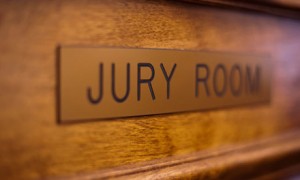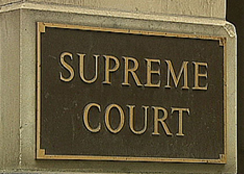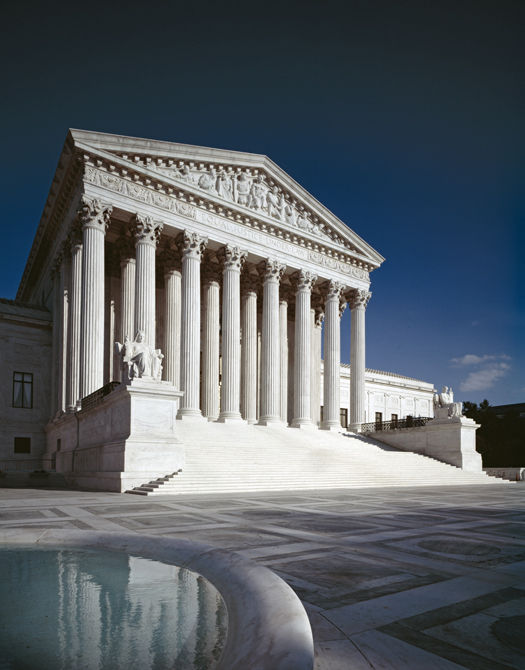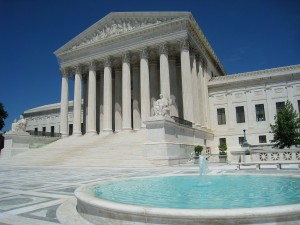Pena-Rodriguez v. Colorado
137 S. Ct. 855 (2017)
United States Supreme Court
Decided March 6, 2017
Issue: Whether an exception to the federal no-impeachment rule applies when a juror makes a statement indicating that he or she relied on racial stereotypes to convict a defendant; or May Rule 606(b) of Colorado’s Rules of Evidence bar evidence of racial bias offered to prove a violation of the Sixth Amendment right to an impartial jury?
Holding: When a juror makes a clear statement indicating that he or she relied on racial stereotypes or animus to convict a defendant, the Sixth Amendment requires that the no-impeachment rule give way in order to permit the trial court to consider the evidence of the juror’s statement and any resulting denial of the jury trial guarantee.
Facts: Petitioner was convicted of unlawful sexual conduct and harassment by a Colorado jury. Two jurors reported to defense counsel that Juror H.C. showed an anti-Hispanic bias toward the petitioner and the petitioner’s witness, which included the statement, “I think he did it because he’s Mexican and Mexican men take whatever they want.” Juror H.C.’s statements were provided in the form of affidavits to the defense counsel.
Although the trial court acknowledged the statements, the court denied the petitioner’s motion for a new trial under Colorado Rule of Evidence 606(b), which provides that a juror who testifies as to statements made during deliberations does not alter the validity of the verdict.
The Court of Appeals and the Colorado Supreme Court affirmed the judgment and agreed that no exception rule applied to Rule 606(b).
 Analysis: After being denied by the Colorado Court of Appeals and the Colorado Supreme Court, the petitioner, on appeal to the U.S. Supreme Court, urged that without an exception for racial bias, Rule 606(b) is a violation of his constitutional right to an impartial jury. Pena-Rodriguez argued that by allowing the verdict to remain after the discovery of such a hateful bias is unjustified and that dismissing such evidence leaves no guarantee to an impartial jury. The petitioner also argued that the evidence may not have been previously available because jurors were not aware of Juror H.C.’s racial prejudices until deliberations.
Analysis: After being denied by the Colorado Court of Appeals and the Colorado Supreme Court, the petitioner, on appeal to the U.S. Supreme Court, urged that without an exception for racial bias, Rule 606(b) is a violation of his constitutional right to an impartial jury. Pena-Rodriguez argued that by allowing the verdict to remain after the discovery of such a hateful bias is unjustified and that dismissing such evidence leaves no guarantee to an impartial jury. The petitioner also argued that the evidence may not have been previously available because jurors were not aware of Juror H.C.’s racial prejudices until deliberations.
First, the U.S. Supreme Court established the importance of the jury in the United States’ founding, stating that the “jury was considered a fundamental safeguard of individual liberty” and it is part of the U.S. Constitution under the Sixth Amendment. Although the jury is a human institution that has its flaws, the justice system aims to protect fair and impartial verdicts.
In general, jury verdicts are well-protected so that they remain final. The no-impeachment rule serves to ensure the protection of jury verdicts by prohibiting statements made during deliberation to later be called into question, which was established in Vaise v. Delaval, 1 T. R. 11, 99 Eng. Rep. 944 (K. B. 1785). Here, the issue presented a question of whether the circumstances allowed an exception to this rule, where a juror has provided information indicating that another juror was motivated to convict the defendant based on racial animus.
The Supreme Court noted that several states across the nation have adopted more lenient versions of the no-impeachment rule. While nine jurisdictions follow the more lenient Iowa Rule, 42 jurisdictions follow the stricter Federal Rule. Within those jurisdictions, sixteen states recognize exception rules regarding racial bias. Further, various Courts of Appeals that have considered evidence of racial bias have come to conflicting conclusions. Three Courts of Appeals have held that there is a constitutional exception for evidence of racial bias. See United States v. Villar, 586 F. 3d 76, 87 88 (CA1 2009); United States v. Henley, 238 F. 3d 1111, 1119?1121 (CA9 2001); Shillcutt v. Gagnon, 827 F. 2d 1155, 1158 1160 (CA7 1987). Other Courts have found that no exception applies to evidence of racial bias. See United States v. Benally, 546 F. 3d 1230, 1240 1241 (CA10 2008); Williams v. Price, 343 F. 3d 223, 237?239 (CA3 2003); Martinez v. Food City, Inc., 658 F. 2d 369, 373 374 (CA5 1981). Given the inconsistent applications of the no-impeachment rule across the nation, it would be challenging to resolve the presented issue without thorough scrutiny.
The Federal Rule of Evidence 606(b) was adopted in 1975. The few exceptions provided by the rule state that a juror may testify about whether: (A) extraneous prejudicial information was improperly brought to the jury’s attention; (B) an outside influence was improperly brought to bear on any juror; or (C) a mistake was made in entering the verdict on the verdict form. C.R.E. 606(b). Few exceptions exist because the rule seeks to uphold the finality of jury verdicts, a concept protected by the United States Constitution. However, an issue arises here because the right to an impartial jury is also a constitutional right.
Although bot h exceptions were rejected, in Reid and McDonald, the U.S. Supreme Court has recognized that there is a possibility of an exception in the “gravest and most important cases.”?United States?v.?Reid,?supra,?at 366;?McDonald?v.?Pless. In Tanner, even where evidence showed that jurors were under the influence of drugs and alcohol, the Court denied any exception applied to Rule 606(b), holding that the Court identified “long-recognized and very substantial concerns” over the rule. 483 U.S., at 127. While the U.S. Supreme Court has consistently denied applying exceptions to the no-impeachment rule, it has not dismissed the possibility that exceptions can apply in extreme and special cases involving bias jurors.
h exceptions were rejected, in Reid and McDonald, the U.S. Supreme Court has recognized that there is a possibility of an exception in the “gravest and most important cases.”?United States?v.?Reid,?supra,?at 366;?McDonald?v.?Pless. In Tanner, even where evidence showed that jurors were under the influence of drugs and alcohol, the Court denied any exception applied to Rule 606(b), holding that the Court identified “long-recognized and very substantial concerns” over the rule. 483 U.S., at 127. While the U.S. Supreme Court has consistently denied applying exceptions to the no-impeachment rule, it has not dismissed the possibility that exceptions can apply in extreme and special cases involving bias jurors.
In its 5-3 decision, the Supreme Court, for the first time, held that the Sixth Amendment requires that the no-impeachment rule give way to permit the trial court to consider the evidence of the juror’s statement and any resulting denial of the jury trial guarantee. While it noted that not every offhand comment indicating racial bias will justify setting aside the no-impeachment bar, a showing of overt racial bias is enough. They pointed to the case at hand and how the alleged statements by the juror here were “egregious and unmistakable in their reliance on racial bias.”
The United States Supreme Court ultimately held that this new racial-bias exception is just adding to the already “existing processes designed to prevent racial bias in jury deliberations” but is a necessary exception because racial bias is such a “familiar and recurring evil that, if left unaddressed, would risk systemic injury to the administration of justice.”


